Winter 2023
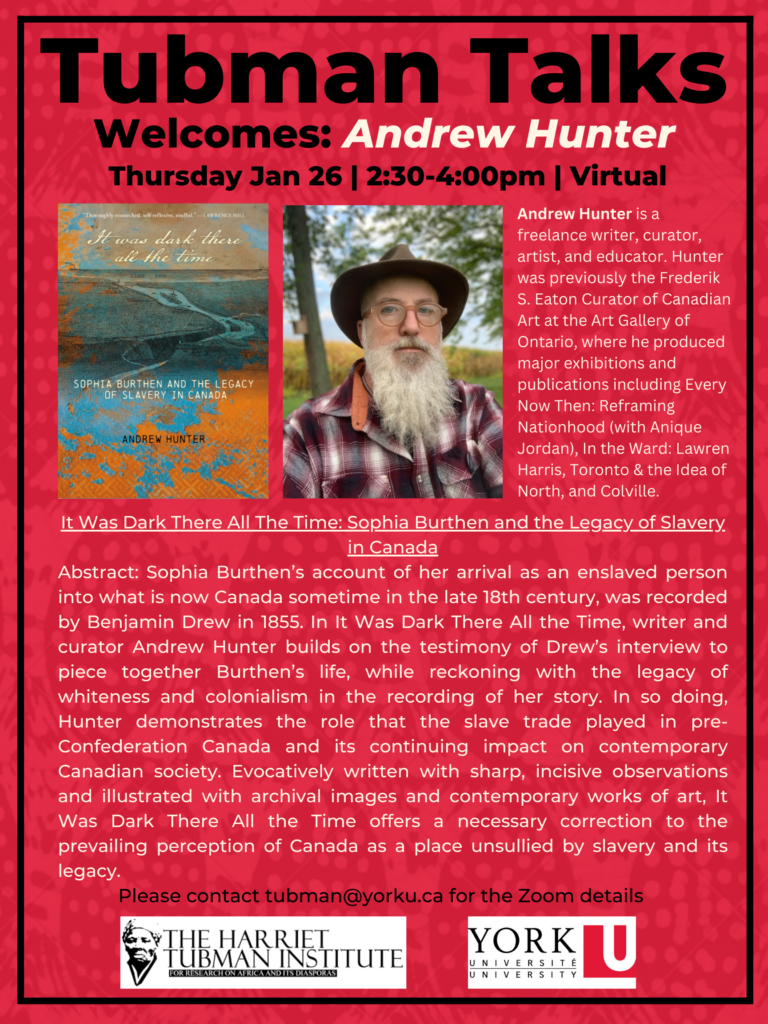
Register in advance for this meeting:
https://yorku.zoom.us/meeting/register/tJYrduisrzgvE9FcTpcMN0csvx6t6mea_yJj
After registering, you will receive a confirmation email containing information about joining the meeting.
Andrew Hunter is a freelance writer, curator, artist, and educator. Hunter was previously the Frederik S. Eaton Curator of Canadian Art at the Art Gallery of Ontario, where he produced major exhibitions and publications including Every Now Then: Reframing Nationhood (with Anique Jordan), In the Ward: Lawren Harris, Toronto & the Idea of North, and Colville.
Born in Hamilton and a graduate of the Nova Scotia College of Art & Design, Hunter has held curatorial positions across Canada, including at the Vancouver Art Gallery and the Kamloops Art Gallery. He has taught at the Ontario College of Art and Design University and the University of Waterloo and lectured on curatorial practice across Canada, the United States, England, China, and Croatia. He is a member of the advisory board for the Slavery Northinitiative at UMass-Amherst, Massachusetts (Directd by Dr/ Chrmaine Nelson).
“My parents were slaves in New York State. My master’s sons-in-law … came into the garden where my sister and I were playing among the currant bushes, tied their handkerchiefs over our mouths, carried us to a vessel, put us in the hold, and sailed up the river. I know not how far nor how long — it was dark there all the time.”
Sophia Burthen’s account of her arrival as an enslaved person into what is now Canada sometime in the late 18th century, was recorded by Benjamin Drew in 1855. In It Was Dark There All the Time, writer and curator Andrew Hunter builds on the testimony of Drew’s interview to piece together Burthen’s life, while reckoning with the legacy of whiteness and colonialism in the recording of her story. In so doing, Hunter demonstrates the role that the slave trade played in pre-Confederation Canada and its continuing impact on contemporary Canadian society.
Evocatively written with sharp, incisive observations and illustrated with archival images and contemporary works of art, It Was Dark There All the Time offers a necessary correction to the prevailing perception of Canada as a place unsullied by slavery and its legacy.
Register for in-person here: https://www.eventbrite.ca/e/tubman-talks-with-dr-wendell-nii-laryea-adjetey-tickets-586071283987
Register for Zoom attendance here: https://yorku.zoom.us/meeting/register/tJAvc-2vpz0vHtTgVW1sR6YEMG1Abq1FtdR-
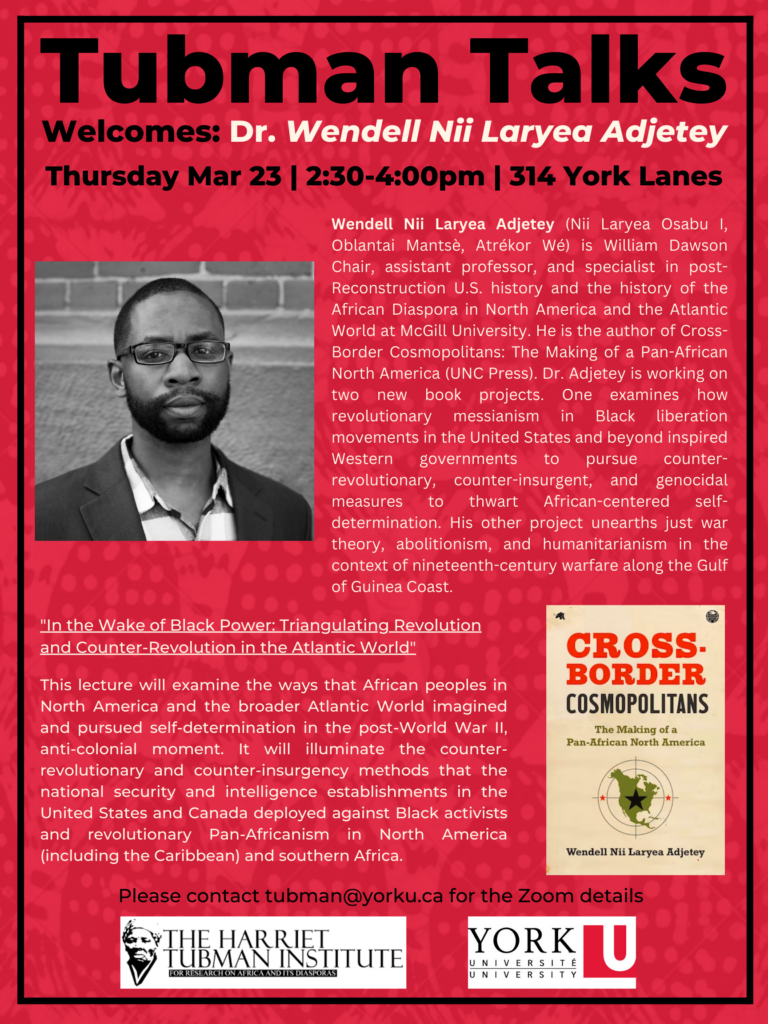
Dr. Wendell Nii Laryea Adjetey (Nii Laryea Osabu I, Oblantai Mantsè, Atrékor Wé) is William Dawson Chair, assistant professor, and specialist in post-Reconstruction U.S. history and the history of the African Diaspora in North America and the Atlantic World at McGill University. He is the author of Cross-Border Cosmopolitans: The Making of a Pan-African North America (UNC Press). Dr. Adjetey is working on two new book projects. One examines how revolutionary messianism in Black liberation movements in the United States and beyond inspired Western governments to pursue counter-revolutionary, counter-insurgent, and genocidal measures to thwart African-centered self-determination. His other project unearths just war theory, abolitionism, and humanitarianism in the context of nineteenth-century warfare along the Gulf of Guinea Coast.
"In the Wake of Black Power: Triangulating Revolution and Counter-Revolution in the Atlantic World"
This lecture will examine the ways that African peoples in North America and the broader Atlantic World imagined and pursued self-determination in the post-World War II, anti-colonial moment. It will illuminate the counter-revolutionary and counter-insurgency methods that the national security and intelligence establishments in the United States and Canada deployed against Black activists and revolutionary Pan-Africanism in North America (including the Caribbean) and southern Africa.
Register on Zoom here: https://yorku.zoom.us/meeting/register/tJIsceuprjkrGNRCp3bDJ3Z_yapQcK76LaUz
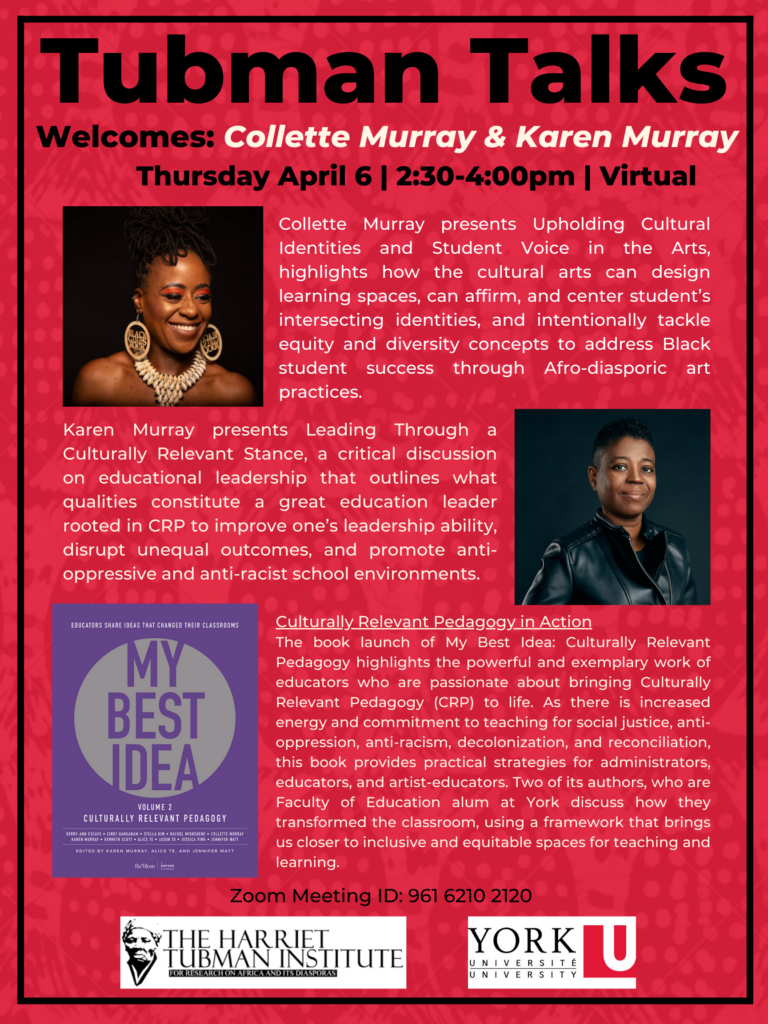
Culturally Relevant Pedagogy in Action
The book launch of My Best Idea: Culturally Relevant Pedagogy highlights the powerful and exemplary work of educators who are passionate about bringing Culturally Relevant Pedagogy (CRP) to life. As there is increased energy and commitment to teaching for social justice, anti-oppression, anti-racism, decolonization, and reconciliation, this book provides practical strategies for administrators, educators, and artist-educators. Two of its authors, who are Faculty of Education alum at York discuss how they transformed the classroom, using a framework that brings us closer to inclusive and equitable spaces for teaching and learning.
Karen Murray presents Leading Through a Culturally Relevant Stance, a critical discussion on educational leadership that outlines what qualities constitute a great education leader rooted in CRP to improve one’s leadership ability, disrupt unequal outcomes, and promote anti-oppressive and anti-racist school environments.
Collette Murray presents Upholding Cultural Identities and Student Voice in the Arts, highlights how the cultural arts can design learning spaces, can affirm, and center student’s intersecting identities, and intentionally tackle equity and diversity concepts to address Black student success through Afro-diasporic art practices.
Biographies:
Karen Murray is System Superintendent, Equity, Anti-Oppression, and Early Years for the first Centre of Excellence for Black Student Achievement in the Toronto District School Board. Karen leads initiatives on Black student success and excellence from K-12 provincially, nationally, and internationally and was the first recipient of the Williams Waters Teacher-in-Residence in Urban Education at OISE, University of Toronto. Most recently, she was appointed by the Ontario College of Teachers to lead the development of an Additional Qualification course on Addressing Anti-Black Racism. In 2020, Karen is an award-winning equitable leader, lecturer, international speaker, and published writer recognized as one of 100 Accomplished Black Canadian Women and York University’s Teacher of Excellence in 2006. Murray is a Ph.D. Candidate at OISE, University of Toronto, and holds a master’s in education, Urban Diversity from York University.
Collette ‘Coco’ Murray is an award-winning dance educator, cultural arts programmer, speaker, and performer with a mobile, dance education business that amplifies Afro-diasporic dance vernacular. Collette is the artistic director of Coco Collective, an intergenerational and multidisciplinary team offering culturally responsive projects in African and Caribbean arts. Murray is the 2022 Racial Justice Award in Creative Arts recipient from Urban Alliance of Race Relations, recognized as one of 100 Accomplished Black Canadian Women in 2020, and the 2019 Community Arts Award recipient from Toronto Arts Foundation for advancing cultural arts, anti-racism work in dance and significant contributions to creating access and inclusion to arts and culture. Murray pursues a Ph.D. in Dance Studies and holds a master’s in education, an Honours BA in Race, Ethnicity, and Indigeneity, and a Certificate in Anti-Racist Research in Practice from York University and a Sociology BA from the University of Toronto.
Register here: https://t.co/4MQ4kfLI39
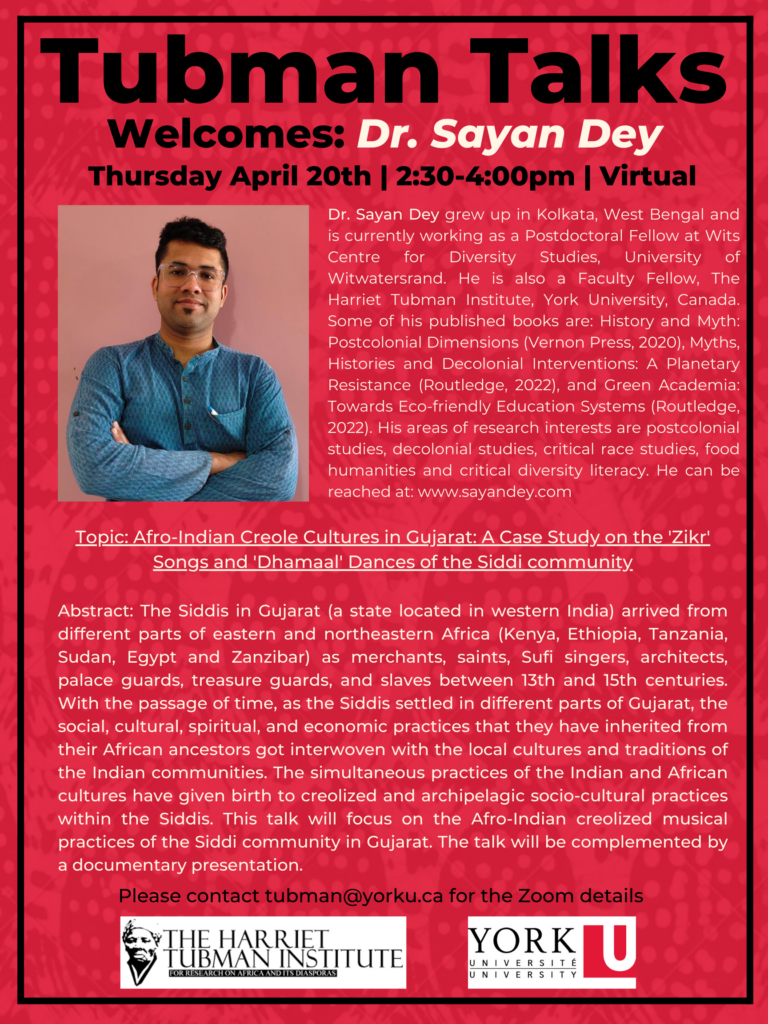
Dr. Sayan Dey grew up in Kolkata, West Bengal and is currently working as a Postdoctoral Fellow at Wits Centre for Diversity Studies, University of Witwatersrand. He is also a Faculty Fellow, The Harriet Tubman Institute, York University, Canada. Some of his published books are: History and Myth: Postcolonial Dimensions (Vernon Press, 2020), Myths, Histories and Decolonial Interventions: A Planetary Resistance (Routledge, 2022), and Green Academia: Towards Eco-friendly Education Systems (Routledge, 2022). His areas of research interests are postcolonial studies, decolonial studies, critical race studies, food humanities and critical diversity literacy. He can be reached at: www.sayandey.com
Topic: Afro-Indian Creole Cultures in Gujarat: A Case Study on the 'Zikr' Songs and 'Dhamaal' Dances of the Siddi community
Abstract: The Siddis in Gujarat (a state located in western India) arrived from different parts of eastern and northeastern Africa (Kenya, Ethiopia, Tanzania, Sudan, Egypt and Zanzibar) as merchants, saints, Sufi singers, architects, palace guards, treasure guards, and slaves between 13th and 15th centuries. With the passage of time, as the Siddis settled in different parts of Gujarat, the social, cultural, spiritual, and economic practices that they have inherited from their African ancestors got interwoven with the local cultures and traditions of the Indian communities. The simultaneous practices of the Indian and African cultures have given birth to creolized and archipelagic socio-cultural practices within the Siddis. This talk will focus on the Afro-Indian creolized musical practices of the Siddi community in Gujarat. The talk will be complemented by a documentary presentation.
Fall 2022
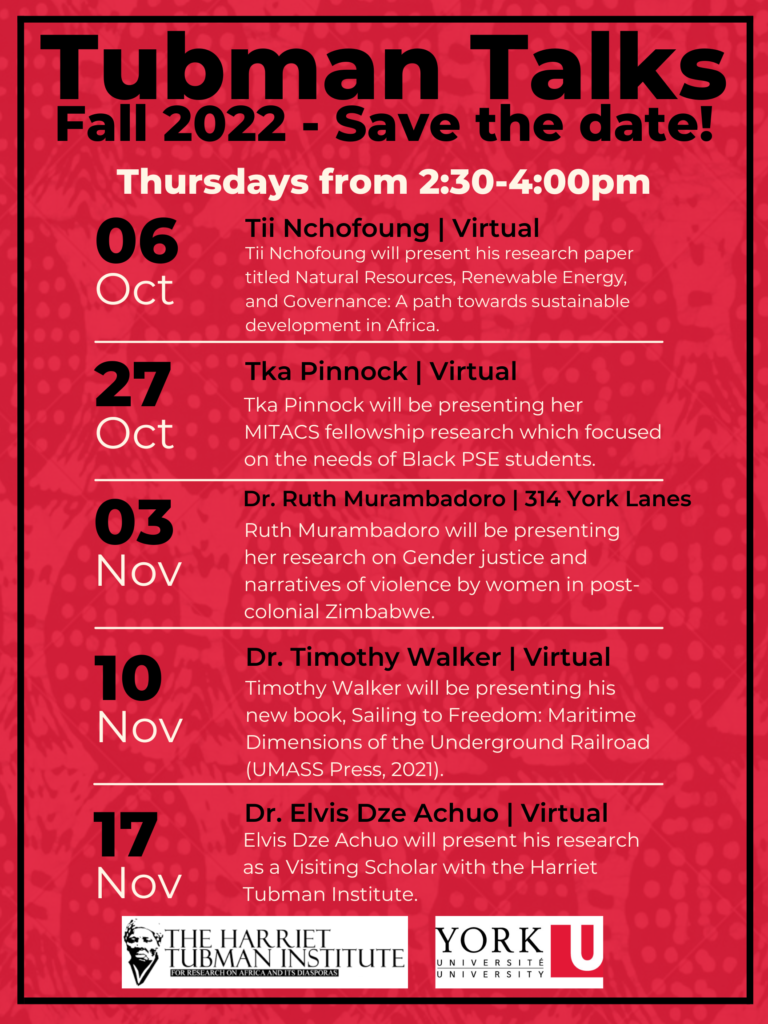
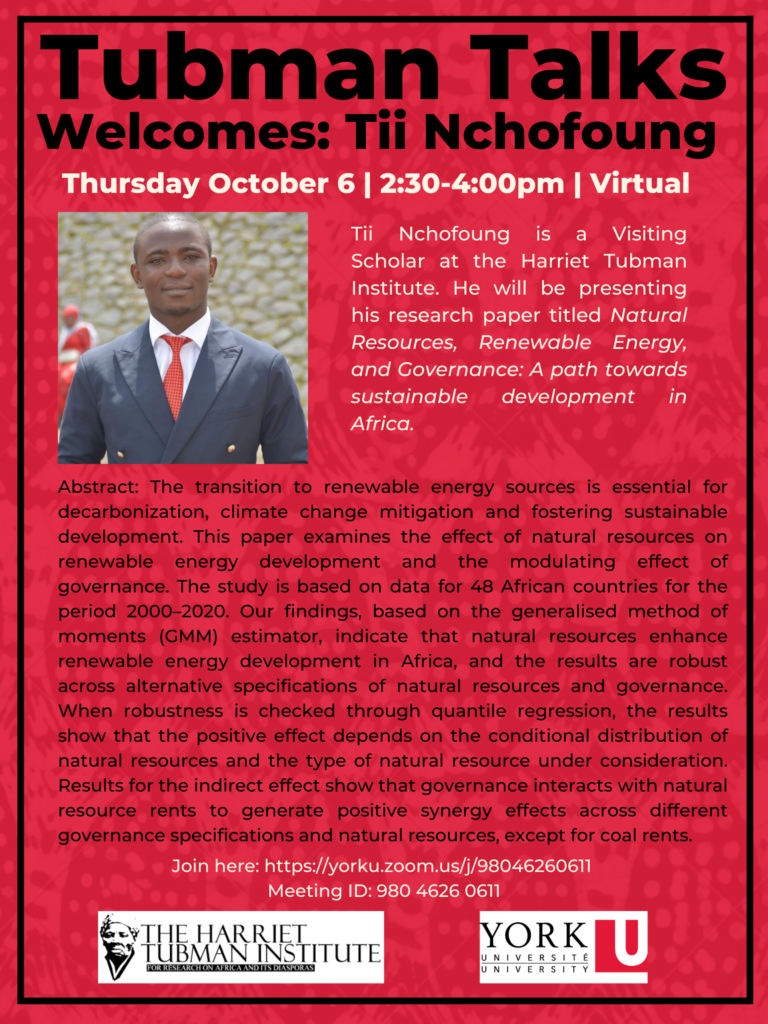
Tii Nchofoung will be presenting his research as a Visiting Scholar at the Harriet Tubman Institute.
Watch the Talk on our Youtube channel here.
Tii Nchofoung holds a Master’s of Science in Mathematical Economics from the University of Dschang, Cameroon. He also holds a Diploma in Administration from the National School of Administration and Magistracy (ENAM), Cameroon. He works as an Administrator with the Ministry of Trade, Cameroon, at the same time, a doctoral candidate in Economics at the University of Dschang. He is also a visiting scholar with the Association of Promoting Women in Research and Development (ASPROWADA), Cameroon. His research works have been published in international peer-reviewed journals among others: Resources Policy, International Economic Journal, Foreign Trade Review, Telecommunications Policy, and International Economics, just to name a few. His research interests are in the fields of international economics, inclusive and sustainable development.
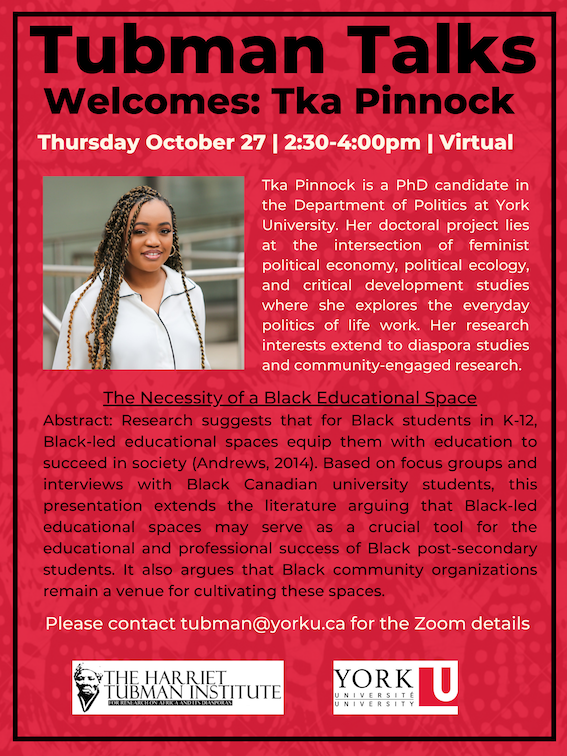
Tka Pinnock is a Research Associate at the Harriet Tubman Institute. She will be presenting her MITACS fellowship research which focused on the needs of Black PSE students.
Tka C. Pinnock is a PhD candidate in the Department of Politics at York University. Her research interests lie at the intersection of feminist political economy, political ecology, globalization and critical development studies where she explores the everyday politics of life work. Her dissertation project explores the constructions of indigeneity among African-descended marginalized workers as a political-economic response to the conditions of economic development, using the tourism sector in Jamaica as a case study. Pinnock’s community work also gives rise to an interest in diaspora studies and community-based research.
Read more here: https://www.yorku.ca/research/tubman/tubman-talks-with-tka-pinnock-the-necessity-of-black-educational-space/.
Watch the recording on our Youtube Channel here.
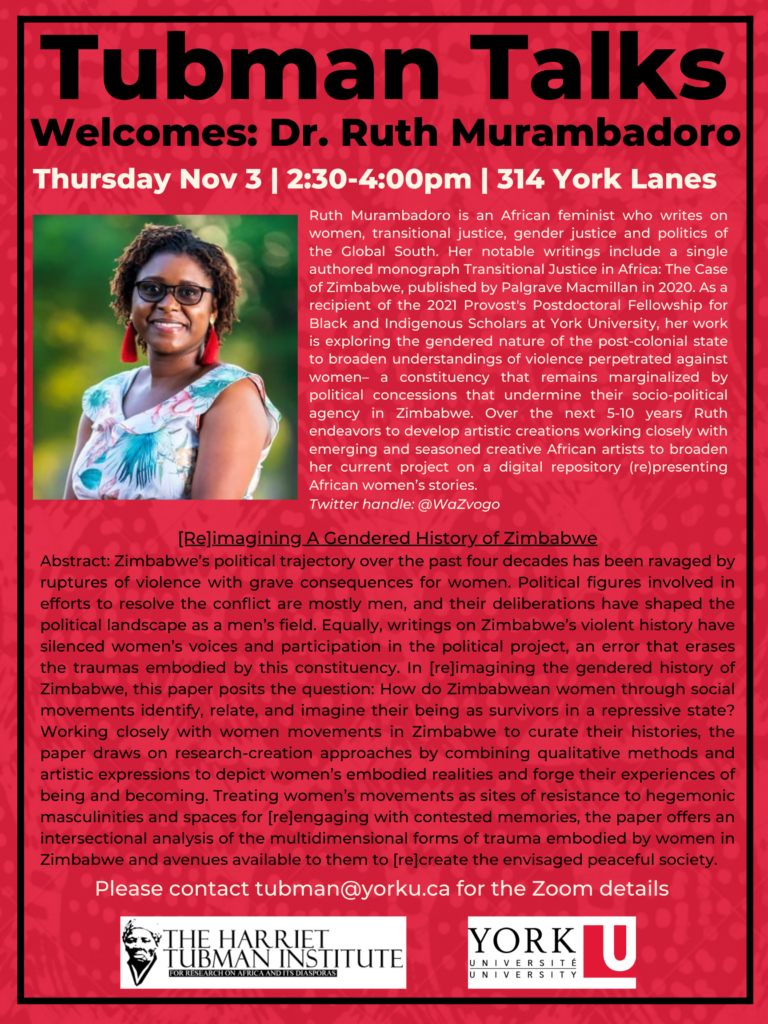
[Re]imagining A Gendered History of Zimbabwe
Presenter: Ruth Murambadoro
Affiliation: Centre for Feminist Research and Harriet Tubman Institute, York University, Canada
Abstract: Zimbabwe’s political trajectory over the past four decades has been ravaged by ruptures of violence with grave consequences for women. Political figures involved in efforts to resolve the conflict are mostly men, and their deliberations have shaped the political landscape as a men’s field. Equally, writings on Zimbabwe’s violent history have silenced women’s voices and participation in the political project, an error that erases the traumas embodied by this constituency. In [re]imagining the gendered history of Zimbabwe, this paper posits the question: How do Zimbabwean women through social movements identify, relate, and imagine their being as survivors in a repressive state? Working closely with women movements in Zimbabwe to curate their histories, the paper draws on research-creation approaches by combining qualitative methods and artistic expressions to depict women’s embodied realities and forge their experiences of being and becoming. Treating women’s movements as sites of resistance to hegemonic masculinities and spaces for [re]engaging with contested memories, the paper offers an intersectional analysis of the multidimensional forms of trauma embodied by women in Zimbabwe and avenues available to them to [re]create the envisaged peaceful society.
Bio: Ruth Murambadoro is an African feminist who writes on women, transitional justice, gender justice and politics of the Global South. Her notable writings include a single authored monograph Transitional Justice in Africa: The Case of Zimbabwe, published by Palgrave Macmillan in 2020. As a recipient of the 2021 Provost's Postdoctoral Fellowship for Black and Indigenous Scholars at York University, her work is exploring the gendered nature of the post-colonial state to broaden understandings of violence perpetrated against women– a constituency that remains marginalized by political concessions that undermine their socio-political agency in Zimbabwe. Over the next 5-10 years Ruth endeavors to develop artistic creations working closely with emerging and seasoned creative African artists to broaden her current project on a digital repository (re)presenting African women’s stories.
Twitter handle: @WaZvogo
This Tubman Talk will be held in the Resource Centre at 314 York Lanes at 2:30pm.
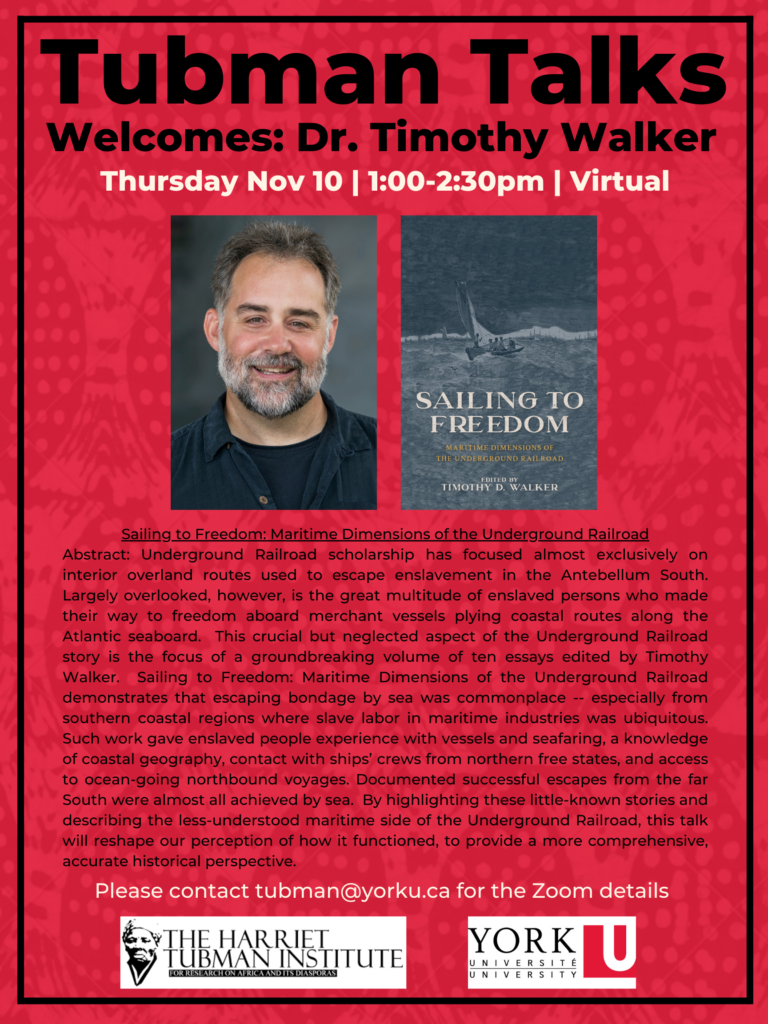
Timothy Walker is a professor of history at University of Massachusetts Dartmouth. He will be presenting On his new book, Sailing to Freedom: Maritime Dimensions of the Underground Railroad (UMASS Press, 2021).
Timothy Walker is a professor of history at University of Massachusetts Dartmouth. He will be presenting On his new book, Sailing to Freedom: Maritime Dimensions of the Underground Railroad (UMASS Press, 2021).
Abstract: Underground Railroad scholarship has focused almost exclusively on interior overland routes used to escape enslavement in the Antebellum South. Largely overlooked, however, is the great multitude of enslaved persons who made their way to freedom aboard merchant vessels plying coastal routes along the Atlantic seaboard. This crucial but neglected aspect of the Underground Railroad story is the focus of a groundbreaking volume of ten essays edited by Timothy Walker. Sailing to Freedom: Maritime Dimensions of the Underground Railroad demonstrates that escaping bondage by sea was commonplace -- especially from southern coastal regions where slave labor in maritime industries was ubiquitous. Such work gave enslaved people experience with vessels and seafaring, a knowledge of coastal geography, contact with ships’ crews from northern free states, and access to ocean-going northbound voyages. Documented successful escapes from the far South were almost all achieved by sea. By highlighting these little-known stories and describing the less-understood maritime side of the Underground Railroad, this talk will reshape our perception of how it functioned, to provide a more comprehensive, accurate historical perspective.
Date: Thursday November 10, 2022
Time: 1:00PM-2:30PM EST
Location: Zoom
Watch the recording on our Youtube channel here.

Date: Thursday November 17, 2022
Time: 2:30pm-4:00pm EST
Location: Zoom
Register in advance for this meeting:
https://yorku.zoom.us/meeting/register/tJwucO-sqD4tGNMwZoG97j2Gr_8k2eRYrknN
After registering, you will receive a confirmation email containing information about joining the meeting.
Elvis D. Achuo holds a PhD in mathematical economics from the University of Dschang, Cameroon. His research interests are in the domains of development and environmental economics, resource and energy economics, and institutional economics. His works in these areas have been published in leading international journals, including Resources Policy, Environmental Science and Pollution Research, Energy Reports, and African Development Review.
Energy consumption and environmental degradation in Africa: Are renewable energies guilty too?
Abstract: Although the question of environmental sustainability has attracted unprecedented interest among academics, policymakers and practitioners in recent years, the debate whether renewable or non-renewable energy consumption enhances or impedes environmental sustainability remains far from being settled. Thus, this study empirically examines the effects of fossil fuel and renewable energy consumption on environmental degradation in Africa over the 1996-2020 period. The study employs the ordinary least squares (OLS), system generalised method of moments (SGMM) and Driscoll-Kraay robust standard errors estimators. Results of these econometric techniques show that energy consumption (both fossil fuel and renewable energy) increases greenhouse gas (GHG) emissions, thereby impeding environmental sustainability. These results are robust across various regional economic blocs and income groups but for Upper-middle-income countries and the Economic Community of Central African States (ECCAS) where energy consumption is environment-enhancing. Furthermore, as regards transmission mechanisms, the results show that the environmental impacts of fossil fuel consumption are modulated through financial development and ICT adoption, leading to respective positive net effects of 0.04460796 and 0.07682873. This is up to respective policy threshold levels of 203.265 and 137.105 of financial development and ICT when the positive net effects are nullified. Contingent on these findings, it is imperative for African countries to develop sound financial systems and encourage the use of green technologies. However, policymakers should also be aware of the critical levels of financial development and ICT, beyond which complementary policies are required for non-renewable energy consumption to maintain a negative impact on environmental degradation.

